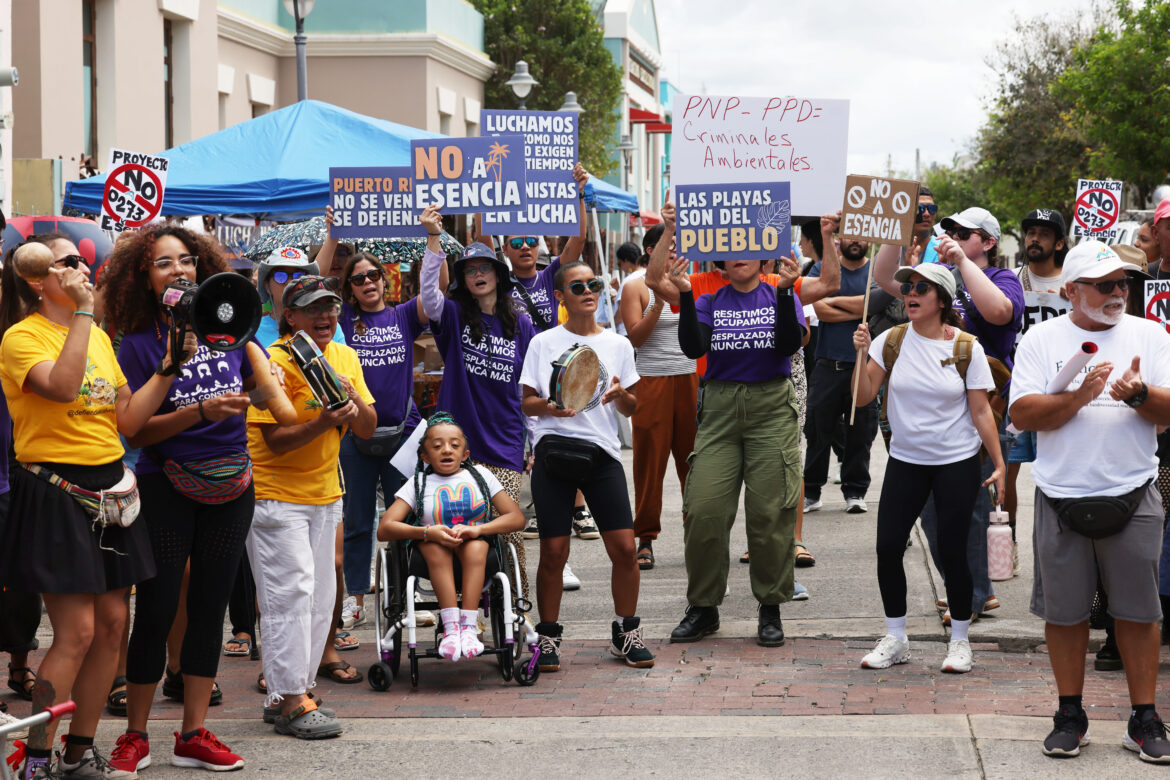
A No a Esencia poster in front of a mural of La Fortaleza and El Morro in the Lower East Side (Photo by Asma Barakat)
NEW YORK — Since January, Puerto Rican activists in the city have been uplifting the efforts of island-based groups opposing Project Esencia, a $2 billion resort planned for the southwestern coast of Cabo Rojo.
Spearheaded by the Reuben Brothers and Three Rules Capital, Project Esencia is described by investors as a luxury resort and residences to be managed by the Mandarin Oriental Hotel. The property is set to span over 2,000 acres and stretch across three miles of beaches in the area.
News of the megaproject has been controversial within the Puerto Rican community, given the environmental consequences and concerns about increased gentrification.
Cabo Rojo residents, activists, and community groups have spent recent months organizing against Esencia. In March, public hearings were held at City Hall, where protesters raised concerns about the project. They argue that its infrastructure would destroy the area’s environmental integrity and lead to the illegal privatization of public beaches.
The former director of the U.S. Environmental Protection Agency’s Caribbean Environmental Protection Division has highlighted the environmental risk. Along with the lack of sufficient water and electrical supplies, environmentalists say the region's geology cannot withstand such large-scale construction, increasing the risk of disasters such as landslides and erosion. They also caution that disrupting Cabo Rojo’s wetlands could throw the area’s ecosystem out of balance and threaten its biodiversity.
Although the properties are slated to open in 2028, local cyclists have already begun facing difficulties accessing the area. Activist Guarionex Padilla Martí explained that the land where Esencia is proposed to be built includes popular cycling and hiking destinations, which are now restricted and closed off. Additionally, water shortages are an existing issue in Cabo Rojo due to the current influx of visitors, according to Padilla Martí.
Given all this, project opponents maintain that creating a luxe tourist destination along Cabo Rojo’s shores would exacerbate these problems while being unsustainable and harmful to the environment, wildlife, and residents.
Strong Alliances
Groups in Puerto Rico have rejected this project by banding together in protest to defend Cabo Rojo and say no to Esencia.
This movement has support from the city’s diaspora community, with increased calls to cancel Project Esencia. Organizations such as the Bori Collective, Juventud Unida por la Independencia (JUPI), Diaspora Pa’lante Collective (DPC), Victory in Puerto Rico (VIPR), Adolfina, Friends of Puerto Rico Impact, and other supporters have carried out multiple protests across the city. They have primarily demanded that investors stop collaborating on the project.
The latest protest of its kind was on April 21, when activists occupied the lobby of the Mandarin Oriental Hotel and unfurled banners in the Columbus Circle luxury mall. Movement leaders cited the same grievances as their counterparts on the island, chanting “Mandarin Hotel out of Puerto Rico.”
A key organization in the diaspora’s opposition to Esencia, the DPC, released a statement detailing its demands: rescind the building permits and ensure the land remains undisturbed. The group described Esencia as a “colonial development project” that prioritizes U.S. interests over native Puerto Ricans.
The DPC also voiced concerns about the creation of an exclusive enclave for wealthy outsiders, the displacement of long-standing communities, the destruction of Cabo Rojo’s ecology, and the disruption of archaeological sites. They warn that if Project Esencia continues, we could soon see a Puerto Rico without Puerto Ricans.
“Esencia is another invasive project specifically meant to displace Puerto Ricans,” said Chris R, a chairperson for JUPI, USA.
Asma Barakat is a freelance journalist based in NYC, covering politics and society.
The portfolio that's automatically up to date with your work.
Authory saves you hours with a portfolio that's always up to date.
Get backups of all your articles.
Be ready to impress potential clients and employers, anytime.
What We’re Reading
Latino Entrepreneurs in California: New UCLA Latino Policy and Politics Institute (LPPI) data shows Latino self-employment grew 44 percent from 2008 to 2022, rising from 559,000 to more than 800,000. Non-Latino self-employment declined over the same period, and without Latino growth, overall numbers would have dropped further.
Consider donating to The Latino Newsletter. Any little bit helps to keep this newsletter free and accessible to all. ¡Gracias mil!










